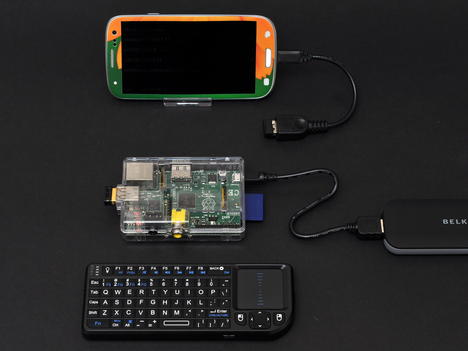Build a Portable Android-based Raspberry Pi Station

Productivity Sauce
Transforming a bare-bones Raspberry Pi into a fully-functional portable station is a popular pastime among enterprising users, and you can easily find instructions on how to build a Kindleberry Pi, a Kindleberry Wireless, and even a Raspberry Pi Linux laptop. But if you happen to use an Android device, you can opt for a less complicated and more modular solution devised by yours truly.
The Android device in this setup acts both as a wireless hotspot and a display for Raspberry Pi. The latter is configured to automatically connect to the Wi-Fi network created by the Android device. And an SSH client app (e.g., VX ConnectBot) running on the Android device is used to access Raspberry Pi via an SSH connection. Here is what you need for this project:
- Android device with wireless hotspot functionality
- An SSH client app like VX ConnectBox installed on the Android device
- OTG (On-The-Go) micro-USB cable (not required for use with a Bluetooth keyboard)
- Wireless mini keyboard with integrated touchpad like the one from Rii
- Wi-Fi USB dongle known to work with Raspberry Pi (e.g., Edimax EW-7811Un)
- Optional external battery pack for powering Raspbery Pi
Start with connecting the keyboard to the Android device using the OTG micro-USB cable. Alternatively, you can use a Bluetooth keyboard which eliminates the need for the cable and makes the entire setup even more elegant. Enable then the wireless hotspot feature. Configure Raspberry Pi to automatically connect to the wireless hotspot. You can do this using the graphical network configuration utility supplied with the Raspbian Linux distribution, or by editing network configuration files by hand. Once you've done that, Raspberry Pi should automatically connect to the wireless hotspot on every boot. On the Android device, find out Raspberry Pi's IP address, then use the SSH client app to establish an SSH connection to it. That's all there is to it. It's also possible to install a VNC server on Raspberry Pi and access its graphical desktop environment using a VNC client on the Android device.
comments powered by DisqusSubscribe to our Linux Newsletters
Find Linux and Open Source Jobs
Subscribe to our ADMIN Newsletters
Support Our Work
Linux Magazine content is made possible with support from readers like you. Please consider contributing when you’ve found an article to be beneficial.

News
-
The Next Linux Kernel Turns 7.0
Linus Torvalds has announced that after Linux kernel 6.19, we'll finally reach the 7.0 iteration stage.
-
Linux From Scratch Drops SysVinit Support
LFS will no longer support SysVinit.
-
LibreOffice 26.2 Now Available
With new features, improvements, and bug fixes, LibreOffice 26.2 delivers a modern, polished office suite without compromise.
-
Linux Kernel Project Releases Project Continuity Document
What happens to Linux when there's no Linus? It's a question many of us have asked over the years, and it seems it's also on the minds of the Linux kernel project.
-
Mecha Systems Introduces Linux Handheld
Mecha Systems has revealed its Mecha Comet, a new handheld computer powered by – you guessed it – Linux.
-
MX Linux 25.1 Features Dual Init System ISO
The latest release of MX Linux caters to lovers of two different init systems and even offers instructions on how to transition.
-
Photoshop on Linux?
A developer has patched Wine so that it'll run specific versions of Photoshop that depend on Adobe Creative Cloud.
-
Linux Mint 22.3 Now Available with New Tools
Linux Mint 22.3 has been released with a pair of new tools for system admins and some pretty cool new features.
-
New Linux Malware Targets Cloud-Based Linux Installations
VoidLink, a new Linux malware, should be of real concern because of its stealth and customization.
-
Say Goodbye to Middle-Mouse Paste
Both Gnome and Firefox have proposed getting rid of a long-time favorite Linux feature.

